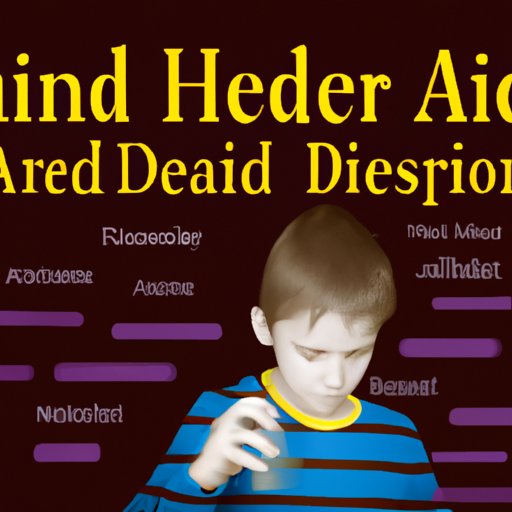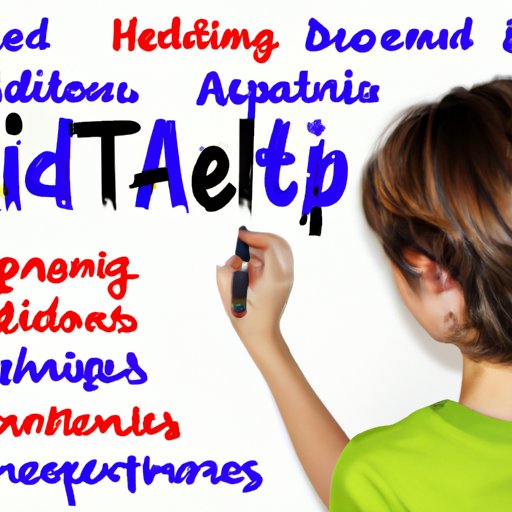Introduction
Attention Deficit Hyperactivity Disorder (ADHD) is a mental health disorder that affects millions of people worldwide. It is characterized by difficulty with concentration, impulsivity, and hyperactivity. While it has long been considered a childhood disorder, recent research has shown that ADHD can continue into adulthood. In this article, we will explore the diagnosis and symptoms of ADHD, examine the research on its causes, discuss available treatment options, look at how it impacts society, and analyze parental perspectives on the disorder.
Examining the Diagnosis and Symptoms of ADHD
ADHD is typically diagnosed during childhood, but it can persist into adulthood. According to the Diagnostic and Statistical Manual of Mental Disorders, 5th Edition (DSM-5), there are three primary types of ADHD: Predominantly Inattentive Presentation, Predominantly Hyperactive/Impulsive Presentation, and Combined Presentation. To be diagnosed with ADHD, individuals must display six or more symptoms from each category for at least 6 months. Common symptoms of ADHD include difficulty paying attention, trouble staying organized, impulsivity, and restlessness.

Exploring Research on the Causes of ADHD
Research on the causes of ADHD is ongoing, but there is evidence to suggest that biological, environmental, and genetic factors play a role in its development. Biological factors such as brain structure and function, neurotransmitter levels, and hormones have been found to be associated with ADHD. Environmental factors such as exposure to lead, tobacco smoke, and alcohol in utero have also been linked to the disorder. Finally, research suggests that genetics may be involved in the development of ADHD, as it is often seen to run in families.

Investigating Treatment Options for ADHD
There is no single treatment for ADHD, but there are several options that can help manage the symptoms. Medications such as stimulants, non-stimulants, and antidepressants can be used to treat ADHD. Behavioral therapy is also an important part of treatment, as it can help individuals learn how to better manage their behavior and emotions. Finally, educational interventions such as specialized teaching methods and accommodations can be used to help individuals with ADHD succeed in school.

Understanding the Impact of ADHD in Society
ADHD can have a significant impact on an individual’s academic performance, social relationships, and employment opportunities. Individuals with ADHD often struggle with focus, organization, and time management, which can lead to poor grades in school. They may also have difficulty making and maintaining friendships due to their impulsivity and hyperactivity. Finally, those with ADHD may find it difficult to stay employed due to their difficulty with concentration and organization.
Looking at How ADHD is Viewed by Different Cultures
The way in which ADHD is viewed by different cultures varies greatly. In traditional cultures, ADHD is often seen as a sign of misbehavior or lack of discipline. This can lead to feelings of shame and stigma for those affected by the disorder. In modern societies, however, ADHD is increasingly being seen as a legitimate mental health disorder, and those affected by it are receiving more support and understanding.
Analyzing Parental Perspectives on ADHD
Raising a child with ADHD can be a challenging task, as parents must learn how to effectively manage their child’s behaviors while still providing them with love and support. Strategies such as setting clear expectations, providing positive reinforcement, and utilizing behavior management techniques can help parents successfully navigate the challenges of raising a child with ADHD. Additionally, connecting with other parents of children with ADHD can provide support and encouragement.
Conclusion
In conclusion, ADHD is a mental health disorder that can have a significant impact on an individual’s life. While there is no single cause of ADHD, research suggests that biological, environmental, and genetic factors all play a role in its development. Treatment for ADHD typically involves medications, behavioral therapy, and educational interventions. Finally, it is important to recognize that the way in which ADHD is viewed varies greatly across cultures, and that parents of children with ADHD need support and guidance.
(Note: Is this article not meeting your expectations? Do you have knowledge or insights to share? Unlock new opportunities and expand your reach by joining our authors team. Click Registration to join us and share your expertise with our readers.)
